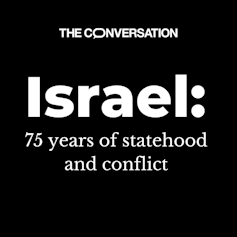On the evening of May 14 1948, the People’s Council of the Jewish Community in Tel Aviv did not wait for the midnight expiry of Britain’s League of Nations mandate in Palestine. The mandate had given Britain administration of the territories of Palestine and Transjordan after the end of the first world war.
Asserting its “natural and historic right” to a homeland and recognition by the United Nations, the council declared the establishment of Israel.
As you’d expect, the declaration of Israel’s statehood made huge headlines around the world. As a researcher of newspaper history, I’ve spent time in the archives of most of the UK’s mass circulation papers of the era. Unfortunately much of this material is behind paywalls, but I’ve been able to see how UK newspapers covered the event at the time.
Eyewitness account
Britain’s Daily Mirror proclaimed the “birth of the first Jewish state for nearly 2,000 years”. The Mirror ran a front-page story on May 15, headlined “Jews Set Up the State of Israel”, which noted the country’s promise of “full and equal” status for Jewish and Arab citizens, and its appeal to the UN for recognition and assistance.
The Manchester Guardian’s eyewitness account, which it ran on page five on May 15 under the headline “Natural and Historic Right”, explained why such support was needed. The proclamation of statehood had taken place “in a subdued atmosphere caused by Jewish military reverses”.
Beneath the banner headline “Israel is born: Arabs Attack”, the Daily Worker’s Derek Kartun reported that the Transjordanian “Arab legion was in action against Jewish settlements south of Jerusalem”. Kartun predicted: “After midnight tonight, armed forces of other Arab states will carry out their promise to join the fight.” Israel had taken its first step towards independence against a “highly dangerous military setting”.

Expert analysis of the birth of the state of Israel and the plight of the Palestinian people.
US president Harry Truman granted Israel and its provisional government immediate recognition. The USSR granted recognition just three days later. Britain’s Labour government did not.
The Daily Telegraph reported that “Britain does not intend, for some time, to grant recognition to the Jewish State of Israel. Such recognition will depend on developments”. The Conservative broadsheet explained that these would include “definition of its boundaries and the establishment of a government clearly in control”. It believed the French government would “adopt a similar stance”.
The Times knew its sophisticated readers wanted to understand this crisis, and reported it from both sides. On May 18 1948, its special correspondent who was accompanying the Arab Legion reported that “Arab irregulars this morning completed the occupation of Neve Jakob [Neve Yaakov], five miles north of Jerusalem”. The correspondent noted that Israeli forces held Mount Scopus, and that this “still makes movement towards Jerusalem difficult”.
The UK’s foreign secretary, Ernest Bevin, thought Britain’s duty was to balance US enthusiasm for Israel with diplomatic sympathy for the Arab case. Bevin’s position was supported by Foreign Office officials who believed friendship with the Arab world was essential to Britain’s economic and strategic interests.
Before the mandate expired, the UK government had hoped to leave in Palestine a majority Arab state in which the Jewish population would be a tolerated minority. The Attlee government believed that immediate recognition of Israel by the US was unfair and encouraged by American Jewish opinion.
Reports from the US
From Lake Success on Long Island, then headquarters of the UN, the Manchester Guardian’s Alistair Cooke described the dangerous complexities facing Israel. “The Security Council was called into emergency session last night,” he wrote, a few hours after the Egyptian delegation had dutifully reported that its forces had entered Palestine “to restore order against Zionist terrorism”.
Moments later, the Jewish Agency for Palestine appealed to the security council to call on the Arab states to “desist from aggression”. It was, Cooke reminded his readers, “the UN Security Council’s first experience with an open and admitted war”. He described Andrei Gromyko, the Russian representative to the UN, sitting in “unflurried silence”, while Dr T.F. Tsiang of China asked how the US could “recognise a Jewish State and, at the same time, seriously ask the Arabs to stop fighting”.
The Labour government’s view was that post mandate, Palestine belonged legally to nobody. For the Foreign Office, a satisfactory solution would see Arab armies establish a state in which a minority Jewish population might live as equals with a Muslim Arab majority. Anxious to keep this option open, Labour argued that Israel’s frontiers were not defined and the Israeli government did not control all the territory it claimed to administer. For the Conservative opposition, Winston Churchill pointed out that Britain recognised several European states whose frontiers were not fixed – Poland among them.
1948 ended with the government of David Ben-Gurion, Israel’s first prime minister, firmly in control. Britain’s objections to recognition became hard to justify. In January 1949, the Daily Mail reported from Israel that “for the first time since the last British soldier left, the Union Jack was seen here today. It was on the car of the British Consul in Haifa, who drove through to tell the Foreign Minister, Mr Moshe Shertok, of Britain’s de facto recognition”.
The Times reported that recognition had been “formally accorded” when “the Israeli Representative in London called on Mr Bevin at the Foreign Office”. Criticism of Britain’s delayed recognition was unfair, it argued. As the important British dominions of India, Pakistan and Ceylon continued to withhold recognition, “the process of prior consultation must have been far from easy”, the Times added.
The press coverage I have studied reflects a British perspective, but this still offers a historic snapshot of global, and national, reactions as a new state was born.
Tim Luckhurst has received funding from News UK and Ireland Ltd. He is a member of the Free Speech Union and the Society of Editors .
This article was originally published on The Conversation. Read the original article.







